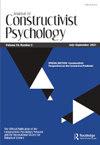释放内心的声音:在无剧本角色扮演中探索超越主导叙事的对话自我
IF 0.7
4区 心理学
Q3 PSYCHOLOGY, CLINICAL
引用次数: 0
摘要
根据对话自我理论,在对话关系中,自我内部存在着多重的自我位置。心理剧将这些位置称为自我的内部部分。我们建议将两者结合起来,以创造一种干预,以无脚本的自我角色扮演为中心,以实现意义创造的目的。我们希望较少占主导地位或沉默的i -立场能够被听到,并被纳入对话。我们用一组24名成年参与者来说明这种方法,他们参与了一个反思性的对话过程,以潜在地改变他们对技术进步的模范话题的态度和观点。采用混合方法来调查这种干预措施的潜在益处。在干预前和干预后,使用问卷收集李克特量表和开放式问题的自我报告态度,以评估与我们的示范病例相关的明确态度和观点。我们使用统计检验和专题分析来比较干预前后的结果。定性结果显示了观点的转变。然而,在态度变化方面,量化结果没有显示出统计学意义。此外,综合定量和定性结果显示,一组参与者的研究结果趋同,而另一组参与者的研究结果则出现分歧。尽管有这些结果,所提出的介入方法有各种潜在的应用前景。本文章由计算机程序翻译,如有差异,请以英文原文为准。
Unleashing the Inner Voices: Exploring Dialogical Self Beyond Dominant Narratives in Unscripted Role-Playing
According to the Dialogical Self Theory, there is a multiplicity of I-positions within the self in a dialogical relationship. Psychodrama refers to these positions as inner parts within the self. We propose an integration of both to create an intervention centered on unscripted intrapersonal role-playing of the I-positions for the purpose of meaning-making. We want less dominant or silenced I-positions to be heard and included in the dialogue. We illustrate this approach with a group of 24 adult participants who engaged in a reflective dialogue process to potentially change their attitudes and perspectives toward an exemplary topic of technological advancement. A mixed-method approach is applied to investigate the potential benefits of this intervention. In pre-and post-intervention, a questionnaire is used to gather self-reported attitudes with Likert-scale and open-ended questions to assess explicit attitudes and perspectives related to our exemplary case. We used a statistical test and thematic analysis to compare the results before and after the intervention. The qualitative results show a shift in perspectives. However, the quantitative results do not show statistical significance regarding attitude change. Furthermore, integrating quantitative and qualitative results shows a convergence of the findings in one group of participants while divergence in the other. Despite these results, the proposed interventional approach promises various potential applications.
求助全文
通过发布文献求助,成功后即可免费获取论文全文。
去求助
来源期刊

Journal of Constructivist Psychology
PSYCHOLOGY, CLINICAL-
CiteScore
2.40
自引率
0.00%
发文量
22
期刊介绍:
Psychology and related disciplines throughout the human sciences and humanities have been revolutionized by a postmodern emphasis on the role of language, human systems, and personal knowledge in the construction of social realities. The Journal of Constructivist Psychology is the first publication to provide a professional forum for this emerging focus, embracing such diverse expressions of constructivism as personal construct theory, constructivist marriage and family therapy, structural-developmental and language-based approaches to psychology, and narrative psychology.
 求助内容:
求助内容: 应助结果提醒方式:
应助结果提醒方式:


